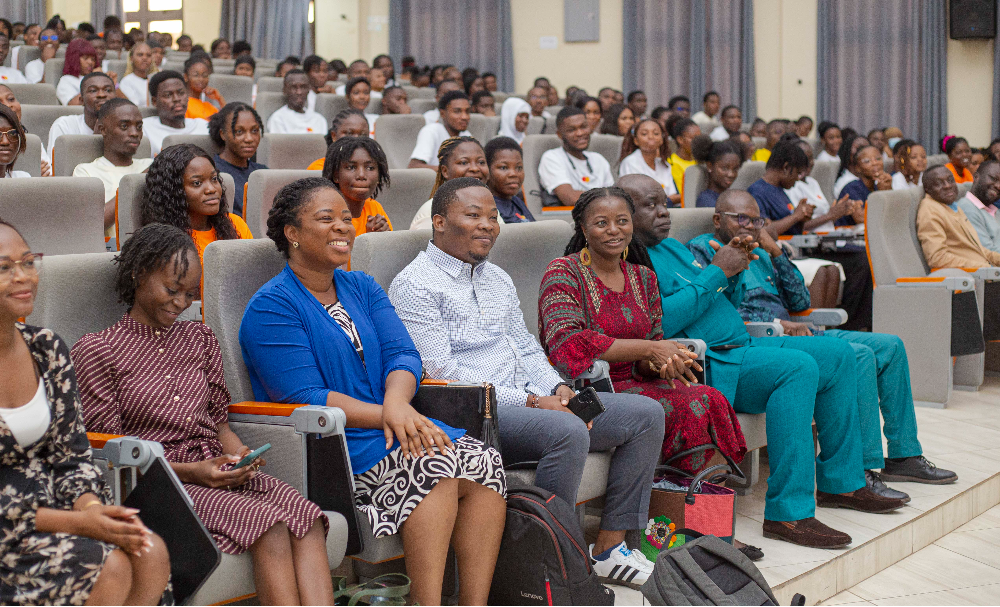Now in its third year, the Sustainable Business Start-Ups (SBS) Training Programme under the Africa Health Collaborative at KNUST is equipping hundreds of young Africans with the tools, mindset, and funding to build impactful ventures to turn personal passion into purpose-driven businesses that address real health and societal challenges.
In a small high school dorm room, Jessica Oppong made her first sale, not out of necessity, but to prove she could. Years later, that same spark of determination blossomed into Dielle, a plant-based haircare brand now empowering young women to embrace their natural beauty.
Jessica’s journey wasn’t smooth. In the second semester of her first year at university, she conceived the idea of using natural materials to fortify her hair. A natural hair enthusiast, she had groomed her tresses to ear length and longed for even more growth. Through diligent experimentation, her hair soon caressed her neck and shoulders.
Then came a pivotal moment. A roommate asked, “Why not start a business out of this?”

Like many young entrepreneurs in Ghana, Jessica faced the usual hurdles: Chief among them, funding. She enrolled in multiple pitch competitions but found herself falling short.
Then came a breakthrough: the Africa Health Collaborative–KNUST’s Sustainable Business Start-Up Entrepreneurship Training, in partnership with the Mastercard Foundation.
With grit and growth, and after persevering through technical glitches during the application process, Jessica secured a $6,750 grant.
“Leadership isn’t about having all the answers,” Jessica says. “It’s about moving forward, even when the path is unclear.”
Africa Health Collaborative
The Africa Health Collaborative is a co-created partnership to strengthen primary health care systems in Africa through health workforce development, transition-to-work, entrepreneurship development and innovation, institutional strengthening, and fostering robust networking and learning opportunities.
Africa has a significant shortage of skilled health workers. Currently, the continent has 2.2 health workers per 1,000 people, compared to the global average of 6.6. By 2030, this shortage if not mitigated is projected to reach a deficit of six million workers. This crisis, compounded by the health sector's limited contribution to Africa's GDP (5% compared to the global 10%) underscores the urgent need for strategic interventions to unlock the sector's economic
The Africa Health Collaborative seeks to leverage higher education institutions to enhance the healthcare landscape by training over 30,000 skilled primary healthcare workers; upskilling 60,000 existing healthcare professionals, supporting the development of 5,000 entrepreneurial ventures to create 20,000 new jobs; advancing healthcare education, and improving access to quality healthcare services.
The Africa Health Collaborative is a multi-year partnership between the Mastercard Foundation, Amref, Addis Ababa University, African Leadership University, the African Institute for Mathematical Sciences, Ashesi University, Kwame Nkrumah University of Science & Technology, Moi University, University of Cape Town, and the University of Toronto. Each partner contributes unique strengths and expertise to drive sustainable growth and transformation of Africa’s health sector while improving regional health outcomes.
By fuelling the aspirations of young people to join the health sector, this partnership is an enabler of and a contributor to the Mastercard Foundation’s Young Africa Works strategy, which seeks to enable 30 million young people, particularly young women, to access dignified and fulfilling work by 2030.
Year 3 focus
Building on the successes of the first two years, the third edition of the Entrepreneurial Training in Sustainable Business Start-Ups Programme has launched at KNUST.
This two-week intensive training, part of the Health Entrepreneurship pillar, has already engaged 200 new students, building on the 400 who participated in the maiden edition.

Led by Prof. Wilberforce Owusu-Ansah, the programme seeks to nurture an entrepreneurial mindset, equipping young Africans to innovate within the health sector and beyond.
“The kind of pedagogy you’re going to have will be full of fun, and above all, very active learning,” he said.
With this year’s expansion, over 600 students have now been trained in sustainable business practices, preparing them to lead the next generation of resilient health ventures.
Voices from the youth
At the KNUST Business School, where they are receiving orientation to begin their journey, students are already feeling the potential of the training.
“I am expecting that at the end of the program, I will be able to gain entrepreneurship skills and bring out my ideas in health,” says Peter Adu-Acquah, a Business Administration student.
Another participant, Abel Ajak Geu Ajak, originally from South Sudan, said, “I am hoping to acquire all the necessary knowledge needed to start a business and to gain entrepreneurship skills. I am also looking forward to getting funding opportunities.”
For Mwinkuu Mantaa Jamillatu, a Tourism Management student, the focus is broader: “I am looking forward to learning how to solve societal problems through entrepreneurship and to gain the skills I need to support my journey.”
Barriers to overcome
Despite the enthusiasm, challenges remain. Young entrepreneurs across Africa continue to grapple with barriers like limited funding, market access, and gaps in mentorship and business development support.
Jessica Oppong’s journey is a testament to these hurdles: early setbacks like faulty packaging and lost sales opportunities could have derailed her, but persistence and structured support made the difference.
The Collaborative recognizes these challenges and is strengthening its approach by expanding access to funding, mentorship, and accelerator programs. The hope is that more young innovators will not only survive but thrive, building ventures that address critical gaps in health systems and create jobs.
“The idea of using entrepreneurship as a solution to unemployment is often couched in neoliberalism, which assumes a one-size-fits-all approach. That’s creating a lot of problems,” Prof. Owusu-Ansah noted.
“What we miss is the context. National context matters, institutional context matters, and regulatory context matters. This is where Sustainable Business Start-ups makes a massive difference.”
Lead facilitator Dr. Isaac Tweneboah-Kodua added, “You’re going to kneel down, you’re going to fall down but the beautiful thing is that by the tenth day, you’ll be a calm person.”
He continued, “You’ll come up and pitch for $10,000 or $5,000 because you’ll develop an idea so viable that it can make a difference in the lives of people.”
Hope for a brighter future
As the Africa Health Collaborative-KNUST enters its third year, the dreams of hundreds of youth shine brighter than ever.
With each business idea nurtured and each entrepreneurial skill sharpened, a new generation is poised to lead Africa’s transformation in health, innovation, and sustainability.
| Story by Emmanuel Kwasi Debrah (URO) | |

















